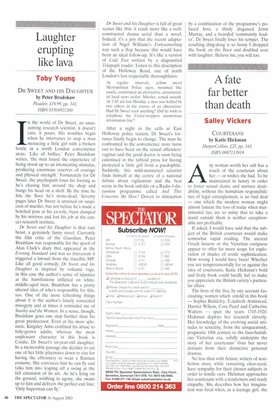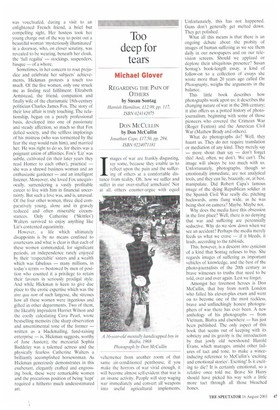A fate far better than death
Salley Vickers
COURTESANS
by Katie Hickman HatperCollins, £25, pp. 343, ISBN 0007113919 Any woman worth her salt has a touch of the courtesan about her — or wishes she had. To be maintained in luxury in order to foster sexual desire and nurture desirability, without the humdrum responsibilities of legal entanglement, is no bad deal — one which the modern woman might almost lament the loss of today when matrimonial ties are so misty that to take a stand outside them is neither exceptionable nor profitable.
If asked, I would have said that the subject of the British courtesan would make somewhat vapid reading. The ancient Greek hetaera or the Venetian cortigiana appear to offer far more scope for exploration of shades of erotic sophistication. How wrong I would have been! Whether you are temperamentally for or against the idea of courtesans, Katie Hickman's bold and lively book could hardly fail to make you appreciate the British variety's particular allure.
The lives of the five, by any account fascinating, women which unfold in this book — Sophia Baddeley, Elizabeth Armistead, Harriet Wilson, Cora Pearl and Catherine Walters — span the years 1745-1920. Hickman deploys her research cleverly. Her knowledge of the evolving social attitudes to sexuality, from the unsqueamish, pragmatic 18th century to the faux-fastidious Victorian era, solidly underpins the story of her courtesans' lives but never detracts from their distinctive personal dramas.
No less than with fiction, writers of nonfiction must, while remaining clear-eyed, have sympathy for their chosen subjects in order to kindle ours. Hickman approaches her courtesans with a tenderness and ready empathy. She describes how her imagination was fired when, as a teenage girl, she
was vouchsafed, during a visit to an enlightened French friend, a brief but compelling sight. Her hostess took her young charge out of the way to point out a beautiful woman 'mysteriously illuminated' in a doorway, who, on closer scrutiny, was revealed to be wearing, beneath her cloak, the 'full regalia' — stockings, suspenders, basque — of a whore.
Sometimes, in her concern to rout prejudice and celebrate her subjects' achievements, Hickman protests a touch too much. Of the five women, only one struck me as finding real fulfilment: Elizabeth Armistead, the friend, companion and finally wife of the charismatic 18th-century politician Charles James Fox. The story of their love affair is truly touching. The relationship, begun on a purely professional basis, developed into one of passionate and steady affection, so much so that Fox defied society, and the selfless implorings of his mistress (who was tormented by the fear the step would ruin him), and married her. He was right to do so, for theirs was a poignant union of affinities. Fox's 'Liz' was subtle, cultivated (in their later years they read Homer to each other), practical — she was a shrewd business woman and an enthusiastic gardener — and an intelligent listener. Moreover, she loved Fox unequivocally, surrendering a vastly profitable career to live with him in financial uncertainty. But such a love was, and is, unusual. Of the four other women, three died comparatively young, alone and in gravely reduced and often miserable circumstances. Only Catherine ('Skittles') Walters survived to enjoy anything like Liz's contented equanimity.
However, a life which ultimately disappoints is by no means confined to courtesans and what is clear is that each of these women commanded, for significant periods, an independence rarely enjoyed by their 'respectable' sisters and a wealth which was fabulous — many millions, in today's terms — bestowed by men of position who counted it a privilege to retain their favours in seriously prodigal style. And while Hickman is keen to give due place to the erotic expertise which was the sine qua non of such largesse, she stresses how all these women were ingenious and gifted in other departments. Two of them, the likeably imprudent Harriet Wilson and the coolly calculating Cora Pearl, wrote bestselling memoirs (the sharp observation and unsentimental tone of the former — written as a blackmailing, fund-raising enterprise — is, Hickman suggests, worthy of Jane Austen); the mercurial Sophia Baddeley was a talented actress and the physically fearless Catherine Walters a brilliantly accomplished horsewoman. As Hickman generously demonstrates in this exuberant, elegantly crafted and engrossing book, these were remarkable women and the precarious position of being 'kept' required a hitherto much underestimated art.











































































 Previous page
Previous page